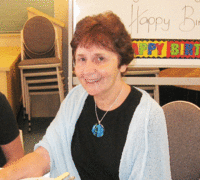 Reflect
Reflect
Veronica M Lawson RSM
1 November 2012
In today’s gospel reading we encounter a good scribe, while in next week’s we find some not so good scribes.
This seems to fit the pattern of the Markan gospel. There are faithful disciples and not so faithful disciples. There are honest Jewish leaders like Joseph of Arimathea and not so honest leaders like those who try to entrap Jesus. There are principled Romans like the centurion who witnesses the death of Jesus and not so principled Romans like Pilate who condemns him to death.
Goodness and fitness for the ‘kin-dom’ or ‘empire of God’ are never guaranteed, according to the Markan schema, by status or position or call or ethnicity or gender or by any other contingency of existence. Everyone has choices, as Andrea is constantly reminded by her boyfriend Nate in The Devil Wears Prada. For a Jew, the first and best choice is to love the God of Israel with one’s whole being and then to love one’s neighbour as oneself.
Jesus and his questioner are agreed on that. Jesus is presented in today’s gospel as a Jew who knows and observes the Law of Moses. He wins the respect of the scribe, a specialist in the Law, who has overheard him debating with the Sadducees.
Jesus recognises the sincerity of the scribe and takes seriously the question that this teacher of the Law puts to him, ‘Which commandment is the first of all?’ He responds in the words of the ‘Shema Israel’ from Deuteronomy 6, today’s first reading. Love of God comes first. It is a love that derives from gratitude for God’s liberating action in the lives of God’s people. Israel has known the unconditional love of God.
Those who know anything about human behaviour would probably agree that the experience of unconditional love engenders an increased capacity for love. For the Jews, including those who throw in their lot with Jesus the Jewish Galilean, to love one’s neighbour is to keep the second commandment of Leviticus 19:18, ‘…you shall love your neighbour as yourself’.
In first-century Judaism, love of God was expressed in worship and in the prayers and rituals of daily life. Love of others likewise found expression in action, not only in care of family and close friends, but also in support of ‘the poor and the needy and the stranger’.
To seek peace was also a feature of neighbourly love. To accept and follow such a programme is to be, with the scribe, ‘not far from’ God’s kin-dom or empire. Contemporary sensibilities might lead us to include the other-than-human among the neighbours or ‘kin’ we are called to love.